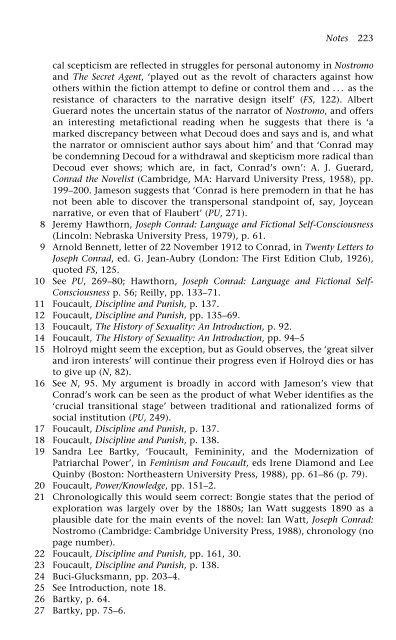Conrad and Masculinity
Conrad and Masculinity
Conrad and Masculinity
Create successful ePaper yourself
Turn your PDF publications into a flip-book with our unique Google optimized e-Paper software.
Notes 223<br />
cal scepticism are reflected in struggles for personal autonomy in Nostromo<br />
<strong>and</strong> The Secret Agent, ‘played out as the revolt of characters against how<br />
others within the fiction attempt to define or control them <strong>and</strong> . . . as the<br />
resistance of characters to the narrative design itself’ (FS, 122). Albert<br />
Guerard notes the uncertain status of the narrator of Nostromo, <strong>and</strong> offers<br />
an interesting metafictional reading when he suggests that there is ‘a<br />
marked discrepancy between what Decoud does <strong>and</strong> says <strong>and</strong> is, <strong>and</strong> what<br />
the narrator or omniscient author says about him’ <strong>and</strong> that ‘<strong>Conrad</strong> may<br />
be condemning Decoud for a withdrawal <strong>and</strong> skepticism more radical than<br />
Decoud ever shows; which are, in fact, <strong>Conrad</strong>’s own’: A. J. Guerard,<br />
<strong>Conrad</strong> the Novelist (Cambridge, MA: Harvard University Press, 1958), pp.<br />
199–200. Jameson suggests that ‘<strong>Conrad</strong> is here premodern in that he has<br />
not been able to discover the transpersonal st<strong>and</strong>point of, say, Joycean<br />
narrative, or even that of Flaubert’ (PU, 271).<br />
8 Jeremy Hawthorn, Joseph <strong>Conrad</strong>: Language <strong>and</strong> Fictional Self-Consciousness<br />
(Lincoln: Nebraska University Press, 1979), p. 61.<br />
9 Arnold Bennett, letter of 22 November 1912 to <strong>Conrad</strong>, in Twenty Letters to<br />
Joseph <strong>Conrad</strong>, ed. G. Jean-Aubry (London: The First Edition Club, 1926),<br />
quoted FS, 125.<br />
10 See PU, 269–80; Hawthorn, Joseph <strong>Conrad</strong>: Language <strong>and</strong> Fictional Self-<br />
Consciousness p. 56; Reilly, pp. 133–71.<br />
11 Foucault, Discipline <strong>and</strong> Punish, p. 137.<br />
12 Foucault, Discipline <strong>and</strong> Punish, pp. 135–69.<br />
13 Foucault, The History of Sexuality: An Introduction, p. 92.<br />
14 Foucault, The History of Sexuality: An Introduction, pp. 94–5<br />
15 Holroyd might seem the exception, but as Gould observes, the ‘great silver<br />
<strong>and</strong> iron interests’ will continue their progress even if Holroyd dies or has<br />
to give up (N, 82).<br />
16 See N, 95. My argument is broadly in accord with Jameson’s view that<br />
<strong>Conrad</strong>’s work can be seen as the product of what Weber identifies as the<br />
‘crucial transitional stage’ between traditional <strong>and</strong> rationalized forms of<br />
social institution (PU, 249).<br />
17 Foucault, Discipline <strong>and</strong> Punish, p. 137.<br />
18 Foucault, Discipline <strong>and</strong> Punish, p. 138.<br />
19 S<strong>and</strong>ra Lee Bartky, ‘Foucault, Femininity, <strong>and</strong> the Modernization of<br />
Patriarchal Power’, in Feminism <strong>and</strong> Foucault, eds Irene Diamond <strong>and</strong> Lee<br />
Quinby (Boston: Northeastern University Press, 1988), pp. 61–86 (p. 79).<br />
20 Foucault, Power/Knowledge, pp. 151–2.<br />
21 Chronologically this would seem correct: Bongie states that the period of<br />
exploration was largely over by the 1880s; Ian Watt suggests 1890 as a<br />
plausible date for the main events of the novel: Ian Watt, Joseph <strong>Conrad</strong>:<br />
Nostromo (Cambridge: Cambridge University Press, 1988), chronology (no<br />
page number).<br />
22 Foucault, Discipline <strong>and</strong> Punish, pp. 161, 30.<br />
23 Foucault, Discipline <strong>and</strong> Punish, p. 138.<br />
24 Buci-Glucksmann, pp. 203–4.<br />
25 See Introduction, note 18.<br />
26 Bartky, p. 64.<br />
27 Bartky, pp. 75–6.




